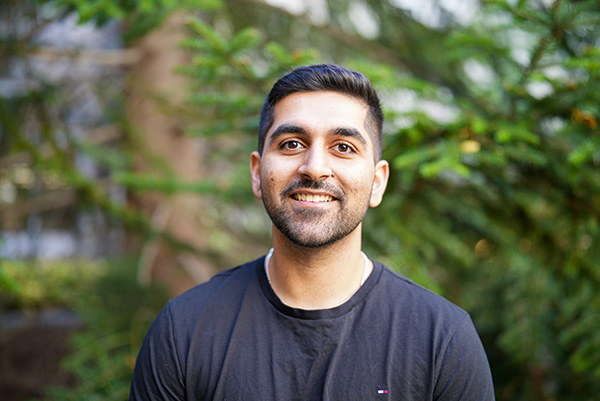Admissions
Equity, Diversity, Inclusion and Decolonization
The School of Graduate and Postdoctoral Studies is committed to equity, diversity, inclusion and decolonization in all aspects of graduate and postdoctoral studies. For more information regarding these commitments please visit grad.uwo.ca/edi-d.
Biology
Master of Science (MSc)Meet Aranya Nagar, MSc candidate in Biology

Supervisor: Alexander Timoshenko
Describe your research.
I work with galectin-12, a human protein which is mainly found in fat cells, and in lower amounts in breast and white blood cells. My project aims to purify human galectin-12 made in E. coli and study its function and role in differentiation of white blood cells using molecular and biophysical techniques. Galectin-12 is downregulated in cancer, but its role is largely unknown which is quite interesting to me. What is this protein doing inside of our cells, and how does it change in states of disease like cancer?
What is it about your grad program that enables you to thrive and be successful?
My supervisor, collaborators, and peers are always supportive and understanding. I feel that the people I am working with care the work we are doing and each other’s success, which is motivating. Further, I get to work with a lot of techniques that I wanted to coming into the program.
What’s the best advice you could give to someone considering applying to your graduate program?
Reach out to a professor and speak to the graduate students working with them. See the work environment, hours expected, funding, compatibility etc. See if you are interested and passionate about the project and subject. Look into which career options you can have afterwords.
Do you serve on any committees?
Currently I am on the seminar committee and graduate education committee for Society of Biology Graduate Students (SOBGS), and the academic committee for SOGS.
Have you worked as a TA or RA?
Working as a TA for first- and third-year courses has been great as I have learned how to manage large groups of students in a lab environment. It also forces me (in a great way) to be on top of the concepts I will teach to them in lab. It is great to hear the questions they have and see my student’s progress. One of my favourite parts of this degree is teaching the Cell Biology laboratory course.
Program Websites
Program Contact
Sarah Abbas (sabbasep@uwo.ca)Graduate Program Assistant
Department of Biology
Western UniversityBiological and Geological Sciences Building Rm 2025C
London, Ontario N6A 5B7
t. 519-661-2111 ext. 81207
f. 519-661-3935
Biology at Western offers research-intensive, thesis-based graduate training at the Masters' and the Doctoral level. We offer world class facilities, a stimulating and collegial training environment, and high profile research programs overseen by internationally recognized faculty. We study life from a variety of perspectives including ecology and evolution, molecular and cellular biology, and physiology and biochemistry.
Program Length
- 6 Terms
Program Design
- Full-time study
- Thesis-based
Funding Information
Applicants are encouraged to apply for the following scholarships (if eligible):
Tuition and Fees
Tuition and fee schedules (per term) are posted on the Office of the Registrar's website at http://www.registrar.uwo.ca/student_finances/fees_refunds/fee_schedules.html
Graduate Student Affordability Calculator
Use this helpful tool to estimate how much money you will need to pay for your tuition, fees, housing, food, and other necessities for a 12-month (three term) academic year.
Admission Requirements
- BSc degree (or equivalent degree in a relevant discipline) from a recognized university or college.
- Achieved at least a 78% overall average in the last two full-time years of the undergraduate degree.
English Language Proficiency
Applicants whose first language is not English must furnish evidence of their proficiency in the use of the English language:
- The Test of English as a Foreign Language (TOEFL). Minimum acceptable score is 600 for the paper and pencil version, 250 for the computer version, or 100 for the internet version with no individual score below 23 of the four skill categories. [Western's TOEFL ID is 0984].
- The International English Language Testing Service (IELTS Academic). Minimum acceptable score is 6.5 out of 9 overall and in each of the four categories.
Application Deadline
Domestic Applicants:
- November 1 - Winter Term
- March 1 - Spring Term
- July 1 - Fall Term
International Applicants:
- June 15 - Winter Term
- November 15 - Spring Term
- March 15 - Fall Term
Applications are processed on a rolling basis. Students are typically notified within one month of receipt of a completed application. Most students apply for and are admitted for the Fall term, but January and May admissions are also considered.
Fields of Research
- Cell and Molecular Biology
- Ecology and Evolution
- Physiology and Biochemistry






